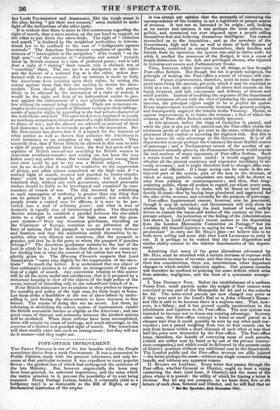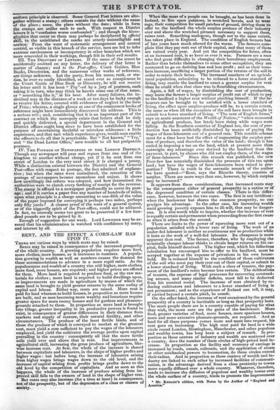POST-OFFICE IMPROVEMENT.
Tim PENNY POSTAGE is one of the few benefits which the People sometimes derive from a weak Government. It was a concession to Public Opinion, made with the greatest reluctance, and only because at that particular moment it was expedient to court popular favour; the gradual loss of which had endangered the existence of the late Ministry. But, however ungracefully the boon may have been granted, its universal importance, and the value which the nation attaches to it, prevent the possibility of its ever being resumed. Penny Postage (unless, indeed, it eventually yield to a halfpenny rate) is as immutable as the Bill of Rights, or any fundamental institution of the empire. It was always our opinion that the monopoly of conveying the correspondence of the country is not a legitimate or proper source of revenue. It was not so intended in its origin ; and, looking at its nature and amount, it was perhaps the most odious, impolitic, and tyrannical tax ever imposed upon a people calling themselves free and believing themselves intelligent. Yet custom reconciled us to the imposition ; and as the members of the Government, high and low, as well as those of both Houses of Parliament, contrived to exempt themselves, their families and friends, from its operation, the system was said to thrive well; for while it swelled the resources of the Budget, it was a cause of hourly distinction to the rich and privileged classes, who rejoiced in Government covers and Parliamentary franks.
Time, however, which innovates on all things, at last brought Post-office Reform. But though the tax is greatly mitigated, the principle of making the Post-office a source of revenue still continues. Future improvements, therefore, must in some degree depend upon fixing the amount, per cent, which it may be expected to yield as a tax ; and upon expending all above that amount on the rapid, frequent, and safe conveyance and delivery of letters and small parcels. Instead of confining the expenses of the department to the minimum of cost with the view of producing the maximum of taxation, the principal object ought to be to perfect the system. Every improvement would eventually increase the general receipts, and consequently augment the returns to the Treasury. Hence, to oppose improvement, is to injure the revenue ; a fact of which the enemies of Post-office Reform seem totally ignorant.
At this moment, before the stage of transition is passed, and
while the plan is not yet fully carried out, the Post-office yields the enormous profit of some_40 per cent to the state, without the employment of any capital or incurring the slightest risk. But this is by no means its only-advantage to the Government. It is of all departments (except perhaps the Customs) the most fruitful source of patronage ; and a Parliamentary return of the number of appointments annually given by the Postmaster-General would expose the real motives of many opponents of Post-office Reform. Such a return would be still more useful: it would suggest inquiry whether all the present cumbrous and expensive machinery is actually necessary ; and it might therefore lead to changes alike economical and efficient. If a large saving can be made in the ministerial part of the system, part of the loss to the revenue, of which so many pathetic complaints are made, will be shown to arise from jobbery or mismanagement ; and thus, that longenduring public, whom all profess to regard, yet whom every man, individually, is delighted to drain, will be found to have been doubly ill-used—first by having been plundered and aggrieved for the sake of the revenue, and secondly for the purpose of patronage.
Post-office Improvement cannot, however, now be prevented,
though it may be retarded ; and Government will only show its wisdom by cheerfully taking the lead, instead of being sulkily driven to consult the wants and wishes of the country on this important subject. An indication of the feeling of the Administration was shown in Lord LOWTHER'S recent answer to the deputation from the London Mercantile Committee on Postage :* but his Lordship did himself injustice in saying he was "as willing as his predecessor" to carry out Mr. Hirs.'s plan—we believe him to be both more willing and more able than Lord LICHFIELD to carry it out. It is perhaps to be wished that the same disposition and similar ability existed in the inferior functionaries of his department.
Admitting that many of the great alterations advocated by Mr. Hu.r., must be attended with a certain increase of expense with an uncertain increase of revenue, and that time may be required for their due consideration, there are, nevertheless, other important changes to which neither objection applies. Our present remarks will therefore be confined to pointing out some defects which arise from mistake, negligence, and the want of a systematic arrangement.
L THE Danner POST. Before the establishment of a uniform Penny Post, small parcels under the weight of four ounces were conveyed to any part of the Metropolis for 2d. and to the suburbs for 3d. The same-sized parcels are now charged one price as if they were sent to the Land's End or to John o'Groat's House : and this is said to be because there is a uniform rate. That, how
ever, is a fallacy ; and it has proved equally inconvenient to the inhabitants and injurious to the Post-office. The new system was intended to increase not to lessen any existing advantage. In every other case, the Post-office conveys a letter or small parcel at a cheaper rate than it could possibly be sent by any other paid conveyance; but a parcel weighing from two to four ounces can be sent from houses within a short distance of each other at less than half the price now demanded by the Post-office. The Post-office loses, therefore, the benefit of conveying most of such parcels, (which are either sent by hand or by one of the private conveyance-companies,) and which could be delivered by the present corps of District postmen without any additional cost to the department. The London public and the Post-office revenue are alike injured —the latter perhaps the most—without any single counter-balancing benefit, and without any apparent reason.
II. STAMPS ON LETTERS. Every letter that passes through the Post-office, whether General or District, ought to bear a stamp containing the date (and hour, if District) and the name of the place where it is posted : the utility of which for tracing a letter is obvious. But let any one compare, as we have done, five or isiz letters of each class, General and District, and he will find that 'to * See the Spectator, 25th December 1841. uniform principle is observed. Some General Post letters are altogether without a stamp ; others contain the date without the name of the place ; some, the place without the date ; while in form the stamps are unlike each to each. With respect to District letters it is "confusion worse confounded" ; and though the hieroglyphics that occur on them may perhaps be deciphered by official skill, to the uninitiated the marks are utterly unintelligible and useless. From the want of systematic arrangement and central control, so visible in this branch of the service, men are led to infer extreme carelessness or incompetency in other branches which are more concealed in their workings, though felt in their evil results. III. THE DELIVERY or Lammas. If the name of the street be accidentally omitted on any letter, the delivery of that letter is matter of chance; and to The Post-office, Court Guides, Blue Books, Directories, and the numerous other works of reference, are things unknown. Let the party, from his name, rank, or station, be ever so easily identified, or stand ever so conspicuous in the Court Guide or Blue Book or Directory, he will not receive his letter until it has been" Try"-ed by a jury of postmen, each taking it in turn, who may think he knows some one of that name, or " something like it," in his beat. After many failures, the individual may at the distance of a week or ten days be lucky enough to receive his letter, covered with evidences of neglect in the form of Tries; whereas, a single glance at one of the commonest books of reference might have immediately discovered his address. This is a serious evil ; and, considering that it is an important part of the contract on which the monopoly exists that letters shall be duly and quickly delivered, a special department in the General and District offices ought long since to have been established for the purpose of ascertaining doubtful or mistaken addresses : a little experience, and that tact which experience gives, would soon enable the officers to do all that is practicable. But Not known," "Try," and "the Dead Letter Office," save trouble to all but peripatetic postmen. IV. THE POSTAGE OF NEWSPAPERS IN THE LONDON DISTRICT. Though any newspaper will pass and repass from one end of the kingdom to another without charge, yet if it be sent from one street of London to the very next street it is charged a penny. While a distinction existed between the District and the General Post-office with respect to postage, the fact admitted of explanation; but when the rates were assimilated, the retention of the postage of newspapers became anomalous and unjust. It shows how unwillingly the reform was adopted, and bow determined the authorities were to clutch every farthing of receipt for the revenue. The stamp is affixed to a newspaper professedly to cover its postage ; and if it carries a paper free any number of hundreds of miles, upon what principle is a charge amounting to one-fifth of the value of the paper imposed for conveying it perhaps two miles, perhaps only fifty yards ? A clearer proof of the want of a general system, or of the niggardly spirit of the Post-office, could not be adduced. In fact, no anomaly seems too great to be preserved if a few hundred pounds are to be gained by it. Enough of suggestion for one week. Lord LOWTHER may be assured that his administration is watched with confidence by many, and interest by all.



























 Previous page
Previous page